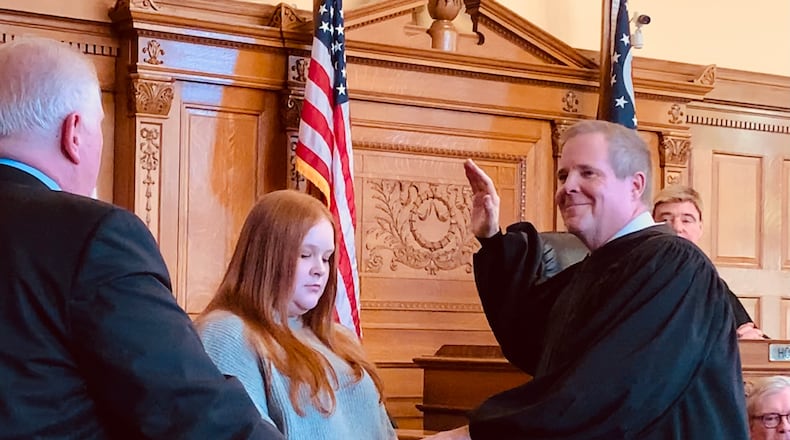The Ohio Supreme Court must approve any application from a court seeking to start a drug or mental health court. Xenia Municipal Court Judge David McNamee said Xenia plans to submit its application in the next 60-90 days, after which the Supreme Court may take six months to approve it.
A combined mental health and drug court works because the two problems often go hand in hand, McNamee said. Significant substance abuse, especially at younger ages, can be a triggering factor for many mental health issues later in life, research shows.
Reports published in the Journal of the American Medical Association indicate that roughly 50% of individuals with severe mental disorders are affected by substance abuse, while 37% of alcohol abusers and 53% of drug abusers also have at least one serious mental illness.
“You can’t help but see the effects that substance abuse has on people’s lives,” McNamee said. “My opinion is that we here have a better chance at intervention. Because they are misdemeanors, we typically get younger people, and people that are just starting to have interaction with the legal system.”
Having a specialized drug and mental health docket may also help to address homelessness in Xenia by getting at some root causes. Those without shelter often end up in Xenia Municipal Court for minor crimes, but are more likely to reoffend because their situation has not changed.
“The most common offense you see with a homeless person is criminal trespass,” said Xenia court administrator Steve Pierson. “So, if that person comes back out and they’re back on the street, the next time it’s cold, the next time it’s snowing, next time it’s raining, that person may find themselves back someplace where they’re not supposed to be. And you get a revolving door.”
Participation in a specialized docket also provides access to federal housing assistance and other material resources that may make defendants less likely to reoffend.
“It is my strong belief that nobody sat down in high school and said ‘I aspire to be homeless in Xenia, Ohio,’ ” McNamee said. “Homelessness is not the problem. Homelessness is a byproduct of individuals who have mental health issues, individuals who have inflicted difficulty into their own life by the choices that they’ve made.”
The Ohio Supreme Court allows courts to implement so-called alternative dockets centering on addiction, mental health, housing, Veterans’ courts, and others. Ohio currently has 41 mental health courts and 121 drug courts, with a total of 262 alternative dockets.
Fairborn Municipal Court, which serves the other half of Greene County, is one such drug court. It uses intervention and alcohol, drug, or mental health treatment as an alternative to traditional case processing. In 2021, Fairborn had four successful drug court completions, two unsuccessful completions, and there are currently five active drug court participants, according to their annual report.
To enroll in the drug court, the defendant typically must enter a guilty plea, follow the course of their treatment plan, and may also be required to pay attorney fees or restitution to victims. At the end of the program, the defendant may come out with a significantly reduced charge, or no charge at all.
If the defendant decides, through words or actions, that they don’t want to go through with the program, then they are charged with the crime as normal, McNamee said.
“It’s not a soft on crime approach,” McNamee said. “We see recidivism all the time. We see repeat offenders and they’re doing the same things over and over again, and they’re not being educated. So the objective of this is to provide education for individuals, to try to understand what it is they’re dealing with, and then give them the tools to be able to deal with these issues that come up.”
About the Author

